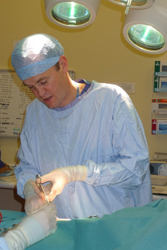Upper GI Surgery
Hernia Repairs (groin, umbilicus, wound hernia)

Surgeon Chris John in theatre
At the RUH we are pleased to be able to offer a Specialized Hernia Clinic. At the clinic we are happy to review any form of abdominal wall hernia, including recurrent and complicated hernias. We will look at anybody with a hernia even if there are other medical conditions as we have the full backup of the medical teams in the hospital.
A new anaesthetic pre-assessment unit is also available so that all the preparation for surgery is done in one hospital visit.
An inguinal hernia is a lump in the groin that occurs when part of your gut (intestine) pushes through a weakness in the muscles of the abdominal wall.
Inguinal hernias are most common in boys and men. They may be present at birth or develop later in life. Straining, heavy lifting, coughing or being overweight increases the pressure within the abdomen, and this puts strain on the muscles in the groin area.
A hernia isn't dangerous in itself, but if it isn't treated it's likely to get larger and become more uncomfortable.
There is a risk that the gut will get trapped inside cutting off the blood supply to the hernia contents (strangulation), causing life-threatening conditions such as gangrene and peritonitis. It may result in the gut becoming blocked.
Inguinal hernia repair involves pushing the hernia back into the abdomen and repairing the weakened muscle. The operation is usually done as a day case under general anaesthesia. This means you will be asleep during the operation. Alternatively you may prefer to have the surgery under local anaesthesia.
There are two main types of inguinal hernia repair - open and keyhole (laparoscopic). Your surgeon will recommend which is suitable for you.
At the RUH we offer keyhole or laparoscopic repair of most hernias including recurrent or bilateral (both sides) hernias. This operation is usually performed as a day case and allows patients to return to normal activities more quickly with much less pain.
Open surgery is the most common way to repair an inguinal hernia. The operation takes 30 to 50 minutes depending on the technique used.
Patient Leaflets about Hernias and Repairs
Umbilical or Paraumbilical Hernia in Adults

